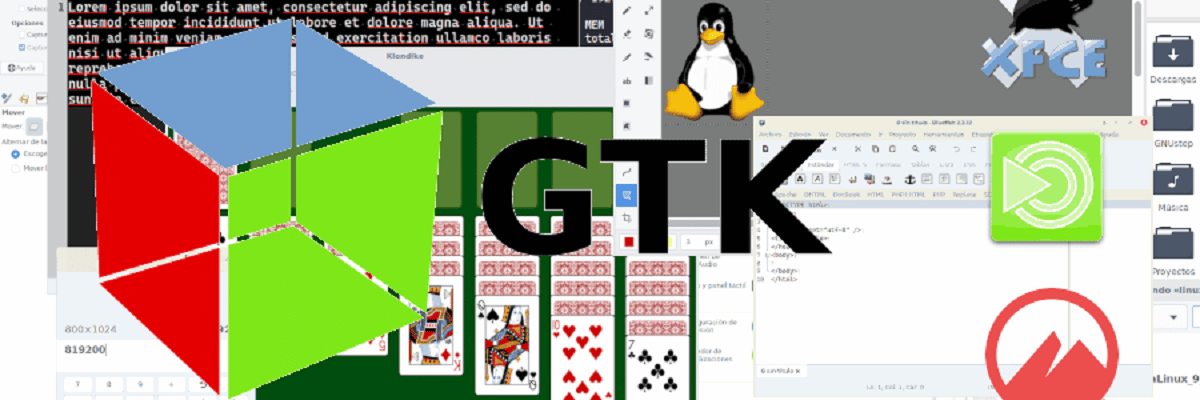
Matthias Clasen, leader of the Fedora desktop team, member of the GNOME release team, and one of the active GTK developers (contributed 36,8% of the changes in GTK 4), started discussing the possibility of deprecating the X11 protocol in the next major GTK5 branch and leaving GTK running on Linux only using the Wayland protocol.
For those unaware of Wayland, you should know that this is a protocol for the interaction of a compound server and the applications that work with it. Clients do their own rendering of their windows in a separate buffer, passing information about updates to the composite server, which combines the contents of the individual application buffers to form the final result, taking into account possible nuances, such as overlapping windows and transparency.
In other words, the composite server does not provide an API to render individual elements, but rather only operates on already formed windows, which allows you to get rid of double buffering when you use high-level libraries like GTK and Qt, which take over the work of sorting the contents of windows.
Wayland resolves many X11 security issues because, unlike the latter, it isolates input and output for each window, does not allow the client to access the content of other clients' windows, and does not allow the interception of input events associated with other windows. Currently, support for working directly with Wayland is already implemented for GTK, Qt, SDL (since version 2.0.2), Clutter and EFL (Enlightenment Foundation Library) libraries. As of Qt 5.4, the QtWayland module is included with the component implementation for running Qt applications in the Weston composite server environment developed by the Wayland project.
About the proposed note deprecation of X11 states that "X11 is not improving and Wayland is now universally available." He further explains that the X11 GTK backend and Xlib-based code are stalling and experiencing issues with maintainers.
It is claimed that for X11 compatibility to survive, someone has to write and maintain the code related to X11, but there are no enthusiasts, and current GTK developers are mostly focused on Wayland support. System developers interested in working in environments based on the X11 protocol can take maintenance into their own hands and extend their support in GTK, but given the current activity, the scenario will be that there will be those who want to take maintenance of the X11 back end. in his own hands is considered unlikely.
Currently, GTK is already positioning Wayland as the leading API and feature development platform. Due to the lack of activity in the development of the X11 protocol, while leaving its support in GTK, the X11 backend will generate an ever-increasing backlog in terms of new functionality available to developers, or become an obstacle to the implementation of new ones. features in GTK.
It is worth mentioning that according to the statistics of the Firefox Telemetry service, which analyzes the data received as a result of sending telemetry and from users accessing Mozilla's servers, the proportion of Firefox users on Linux who work in environments based on in the Wayland protocol it does not exceed 10%.
90% of Firefox users on Linux continue to use the X11 protocol. A pure Wayland environment is used by around 5-7% of Linux users, and XWayland by around 2%.
The information used for the report covers approximately 1% of the telemetry received from Firefox users on Linux. The result can be greatly affected by disabling telemetry in packages with Firefox that are offered in some Linux distributions (telemetry is enabled in Fedora).
Meanwhile KDE plans in 2022 to bring the Wayland protocol-based Plasma desktop session to a suitable state for daily use by a significant proportion of users. Significantly improved support for Wayland in KDE Plasma 5.24 and 5.25, including support for color depths greater than 8 bits per channel, "DRM leasing" for VR headsets, support for taking screenshots, and minimizing all windows.
Okay, if Linux software developers don't want to voluntarily go over to Wayland, they're going to have to close the doors on X11, and force them to evolve.
Dear, I would like to make a small contribution to this article. All the assessments said are viable and VERY WELL FOUNDED. Let's not forget, before making decisions, that it has taken many years to implement any Linux version popularly speaking and it has been achieved thanks to the X11 protocol. The latter has become attractive and easy to use by the youth.
The X11 protocol and its improvements over approximately 20 years or more, has managed to attract users of other operating systems (Win). He learned with X11 not to be afraid to use any Linux distribution.
Moving away from the X11 protocol, taking into account what Mozilla(*) said, is it prudent?
Very best regards. Billy
(*) 90% of Firefox users on Linux continue to use the X11 protocol